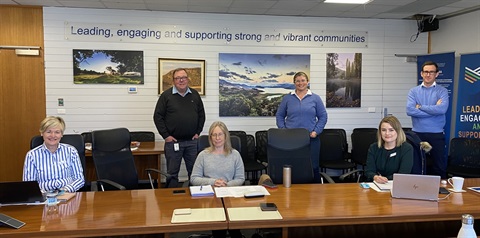Bushfire Recovery Enters New Phase
Published on 09 July 2020

Snowy Valleys Council’s focus on Bushfire Recovery is expanding in partnership with the Government’s new Rural Recovery Support Service and the National Bushfire Recovery Agency.
Council’s Chief Executive Officer Matthew Hyde said, “We are excited to continue this community work with the additional help from the Department of Primary Industries’ Rural Recovery Support Service and the National Bushfire Recovery Agency, and see Council’s role as a vital connection point between the community and the State and Federal agencies.
“With the additional resources now being provided by the Rural Recovery Support Service and the National Bushfire Recovery Agency, we are well placed to move to the next phase and are confident the community will have access to necessary support for immediate needs and to develop what is needed for long term community recovery,” he said.
The initial recovery team has now returned to their roles within Council, with Council’s Community Recovery Officer, which is jointly funded by the NSW and Federal Governments continuing to ensure focus is maintained on the recovery efforts over the longer term.
“As well as working with DPI and the NBRA, Council’s Community Recovery Officer will coordinate and facilitate projects, activities and events for the community that will contribute to our region’s recovery, and build community resilience and future disaster preparedness,” said Mr Hyde.
Managed by the NSW Department of Primary Industries (DPI) and funded by the Office of Emergency Management, the Rural Recovery Support Service specialises in helping agriculture, farming and small communities grow and thrive and is led by a Senior Bushfire Recovery Officer with support from three local Recovery Officers.
The Rural Recovery Support Service team will continue the good work of Council’s recovery team over the past six months, focusing on giving one-on-one support and being available for individual and business needs. They can help identify and prepare grants, connect people to other service providers in the region, and assist with business recovery.
The Snowy Valleys’ bushfire recovery will also be supported at a Federal level by the National Bushfire Recovery Agency.
Local recovery efforts
Council first formed a bushfire recovery team in the aftermath of the Dunns Road Bushfire crisis to support bushfire affected community members at a local grass roots level, working to ensure individuals had access to the appropriate level of information and assistance to inform their personal recovery plans whilst navigating unfamiliar systems.
Initially the team was mobile with the use of the “Charlie” truck (generously provided by Wagga Wagga City Council) with an outreach focus to meet impacted residents on the ground in their own communities at 19 Mobile Community Recovery Meetings across the region.
The outreach provided a coordinated response location for multiple government departments and agencies that were eager to ensure that their information was being provided to those that needed them.
In mid-February Recovery Assistance Points (RAPs) were opened and the service operated for five weeks over four locations, Batlow, Adelong, Talbingo and Tumbarumba ensuring ongoing support for local residents recovering from the bushfire disaster.
A second round of mobile outreach was organised for March but as COVID-19 restrictions were imposed, the project team adapted their outreach activities. More information was placed online utilising Council’s Facebook page and designated website; 140 individuals were contacted via telephone to assess individual needs and provide referrals, and the hard copy distribution of the weekly bushfire recovery bulletin was increased.
Working with the local radio station, a weekly radio segment was established. Zoom Meetings were set up between recovery team members and representatives of agencies and support organisations.
In June with COVID-19 restrictions eased a third round of outreach was organised and the team, along with supporting agencies visited six locations with attendance topping 150.
“Our recovery team have demonstrated commitment and passion towards helping our communities through their recovery journey, with the help of internal staff and external support agencies they have achieved great inroads in the recovery process,” said Mr Hyde.
Photo credit: The new Snowy Valleys’ Recovery Team – Council’s Community Recovery Officer Andrew Rae with the Rural Recovery Support Service Team Mary Hoodless, Janelle Jenkins, Catherine Marriott, Lisa Clout and Charles Roche.